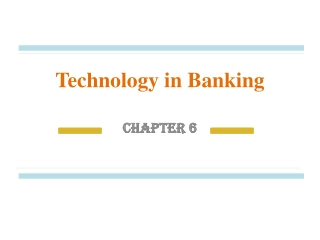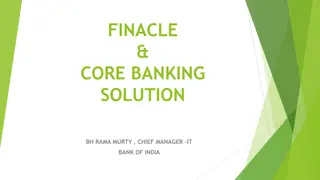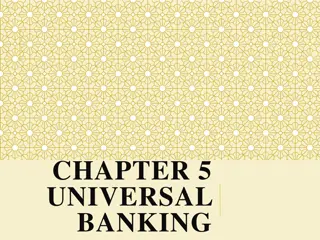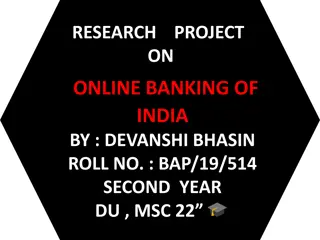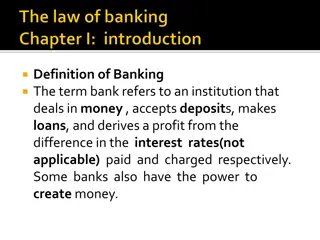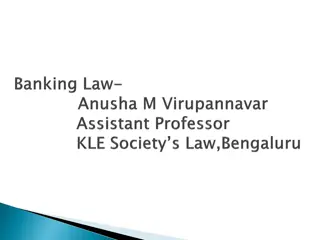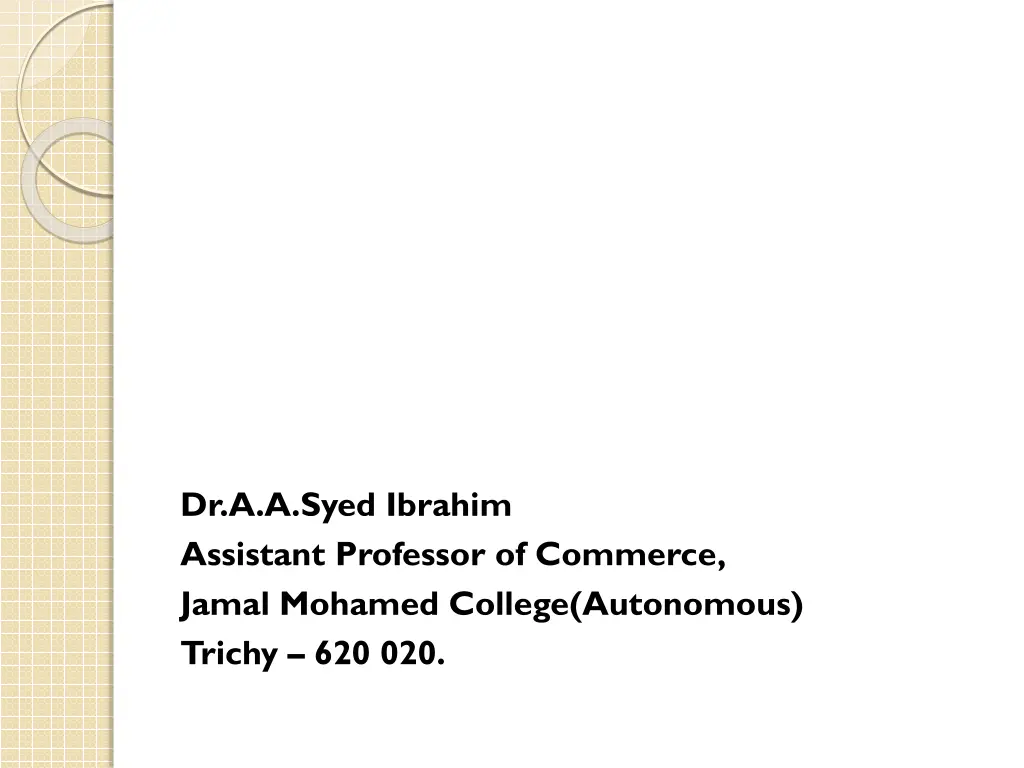
Understanding Banking Customers and Types in Indian Banking System
Explore the concept of banking customers in the Indian banking system, including the meaning of a customer in banking, types of banking customers such as individuals, joint Hindu families, partnership firms, and limited liability companies. Learn about the requirements for opening accounts for different types of customers.
Download Presentation

Please find below an Image/Link to download the presentation.
The content on the website is provided AS IS for your information and personal use only. It may not be sold, licensed, or shared on other websites without obtaining consent from the author. If you encounter any issues during the download, it is possible that the publisher has removed the file from their server.
You are allowed to download the files provided on this website for personal or commercial use, subject to the condition that they are used lawfully. All files are the property of their respective owners.
The content on the website is provided AS IS for your information and personal use only. It may not be sold, licensed, or shared on other websites without obtaining consent from the author.
E N D
Presentation Transcript
Dr.A.A.Syed Ibrahim Assistant Professor of Commerce, Jamal Mohamed College(Autonomous) Trichy 620 020.
Banking customers and types of banking customers in indian banking system. Meaning Customer in Banking A customer is a person who has an account with a bank or has a relationship with the banker even though he has no account with the bank. The question of whether a person is a customer of a bank is a matter of fact and an occasional or even regular encashment of a cheque, for example, is not sufficient to establish the relationship of banker and customer. The duration of the relationship is not of the essence.
Types of Banking customers Individuals Joint Hindu Families Partnership Firms Limited Liability Companies Clubs and Associations Trusts
1. Individual The depositor should be properly introduced to the bank and KYC norms are to be observed. Introduction is necessary in terms of banking practice and also for the purpose of protection under section 131 of the Negotiable Instruments Act.Usually,banks accept introductions from the existing customers, employee of the bank, a locally well- known person or another bank. A joint account may be opened by two or more persons and the account opening form etc., should be signed by all the joint account holders. When a joint account is opened in the name of two persons,the account operations may done by Either or survivor Both jointly Both jointly or by the survivor Former or survivor
2. Joint Hindu Family (JHF): Joint Hindu Family (JHF) (also known as Hindu Undivided family) is a legal entity and is unique for Hindus. It has perpetual succession like companies; but it does not require any registration. The head of JHF is the Karta and members of the family are called co-parceners. The JHF business is managed by Karta.
3. Partnership firms A partnership is not a legal entity independent of partners.It is an association of persons.Registration of a partnership is not Partnership Act. However, many banks insist on registration of a partnership. In any case, ie stamped partnership deed or Partnership letter should be taken when an account is opened for a partnership. The partnership deed will contain names of the partners, objective of the partnership, and other operational details, which should be taken note of by the bank in its dealings. compulsory under
4. Joint stock companies (Limited Liability Companies) A company is registered under companies Act has a legal status independent of that of the share-holders. A company is an artificial person which has perpetual existence with limited liability seal.Memorandum and Articles of Association, Certificate of Incorporation,Resolution passed by the Board to open account, name and designations of persons who will operate the account with details of restriction placed on them are the essentials documents required to open an account. and common
5. Clubs, Societies and Associations The clubs, societies, association etc., may be unregistered or registered. Account may be opened only if persons of high standing and reliability are in the managing committee or governing body. Copy registration and Copy of bye-law, certified to be the latest, by the Secretary/President are required to be obtained and also a certified copy of the resolution of the Managing Committee/Governing body to open the bank account and giving details of office bearers etc.,to operate the account. of certificate of
6. Trust Account: Trusts are created by the settler by executing a Trust Deed. A trust account can be opened only after obtaining and scrutinizing the trust deed.The Trust account has to be operated by all the trustees jointly otherwise in the trust deed. A trustee cannot delegate the powers to other Trustees except as provided for in the Trust Deed. A cheque favoring the Trust shall not be credited to the personal account of theTrustee. unless provided

